FORGOTTEN SOLDIERS II: The bombed soldier who is now a ‘vampire’… and others at the mercy of the army’s ‘blood-stained corruption’
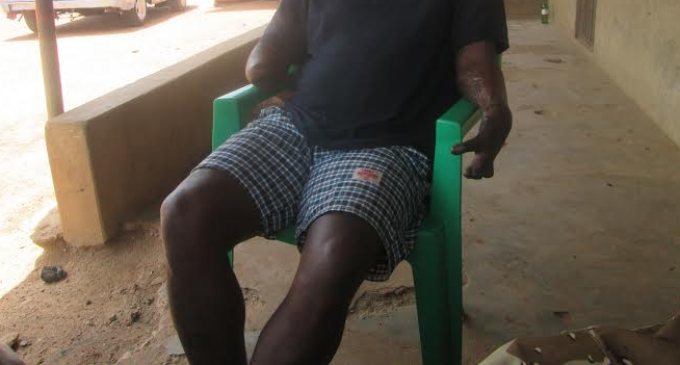
Since 2009, Nigerian soldiers have been going into battle with Boko Haram — with far inferior arms and ammunition — knowing this is the only proof of their love for fatherland. But once they sustain injuries on the battlefield, they soon discover that this love is unreciprocated. ‘Forgotten Soldiers’ is a five-part series exploring the agony of soldiers shattered by Boko Haram’s bullets and mines, and what their pains mean for their loved ones.
Joel Hamidu (pseudonym) has no business being alive. The story of his survival is the purest example of the steel and zeal of the average Nigerian soldier — attributes so rarely spoken of, yet remain partly responsible for Boko Haram’s failure to overrun the north-east as cruelly planned.
Blown away by an Improvised Explosive Device (IED) on August 13, 2015, with parts of his body flung either side of the road and his intestine bursting out of his stomach, Hamidu was given no chance to survive. But as he strolled into the 44 Nigerian Army Reference Hospital, Kaduna, on a rainy morning in the third week of May, to discuss his close shave with death, no one would have imagined the blast had only been eight months old.
Although he had lost a limb and half of another, he managed to extricate himself from a vehicle unaided after arriving the agreed meeting point, and energetically bantered with a few soldiers. Just one look at him and one could tell this was a man simply grateful to be alive.
But he betrayed his regrets, too, occasionally punctuating his narration by questioning the country’s love for its warriors. “Is this the same country we fought for, the one we risked our lives for?” he would wail from time to time.
Blast from the pit of hell
“I remember clearly. It was August 13, 2015,” he begins, recalling his last day on the battlefield.
“We were about to go on patrol but the vehicle was not starting, so I tried to open the bonnet to check the batteries and stuff like that.”
He was still trying to figure out the fault when he heard a bang that hurled his body across the road, sending him into blackout. When he regained consciousness half-an-hour later, he was “surprised” that he was still alive.
Left for dead
That surprise must have been spawned by the extent of the damage. His hands had been mangled, his intestine ripped open and his entire body blood-stained. When he was evacuated to the 7 Division Medical Services and Hospital, Maiduguri, health workers abandoned him, thinking he was already death-bound and any time on him would amount to waste.
“They were like this guy will die any moment from now so attending to him is of no use. I was taken to the rear of the hospital,” he says.
“I was abandoned there… they were just waiting for me to give up so they could quickly throw me into the cemetery. But I refused to die. I went through hell, anyway. There is one thing about life; when you are battling for your life you can go to any extent to survive. I said ‘God I don’t want to die.’
“I know I have been fighting; I have been killing people: he that lives by the gun dies by the gun, but my fight is justifiable. I am trying to risk my own life for other people. When I die, who will be left to save these innocent civilians? I have a wife and three kids; if I should die now, what will be their fate?”
His moment of salvation arrived when some soldiers came to the backyard, wanting to urinate. Already feeble from several hours’ loss of blood, Hamidu mustered all the strength left in him just to shake his leg, thereby drawing the attention of the soldiers.
Angered by the sight of an abandoned dying colleague, the compassionate soldiers lifted him to the emergency ward, from where he was rushed to the x-ray department.
“It was in the x-ray department that I collapsed; there was so much loss of blood already,” he says.
“That was when they brought an ambulance to take me to University of Maiduguri Teaching Hospital (UMTH).
“I got there at about 7.30pm. The incident happened at 10 in the morning, so check the number of hours for which I was left unattended to. If God wasn’t on my side, I would have given up the ghost.”
There are officers, and there are officers
Far from the lacklustre reception he had at the 7 Division Medical Services and Hospital, Maiduguri, doctors at UMTH “really tried”. The Nigerian army medical rep at the hospital received him and called the doctors; they, too, responded swiftly. “Eight to 10 doctors” in all, their head told Hamidu he stood no survival chance irrespective of quality of treatment, if he was not determined to fight.
“He was angry that I didn’t receive medical care for 12 hours but I said ‘Oga, forget about that, all I need now is your help; just assist me so that I will not die.
“He asked me: ‘Are you willing to survive? Treatment in a situation like this is about the patient having the will to survive.
“I said oga I am willing. If I could stay alive from 10:00am to 7.30pm, I believe that with your little effort, I will buy more life.”
Not long after he was wheeled into the theatre, Hamidu passed out. He remained in that state for six days. When he regained sanity on August 19, he discovered that his damaged hands had been chopped off. It was a bittersweet feeling: he was grateful to be alive; yet, without his hands, he admitted he looked “like a vampire”.
“So I happened to find out that my two hands were gone,” he says in a heavy tone. “I was sober anyway; I couldn’t believe it… but I really battled for my life.”
Hamidu reserved special praise for his commanding officer (CO), “a very nice man” who gave him “all the support” he needed.
“He promised me some money. He said if the prosthesis was something he could afford, he would get it for me. Even when my wife came, he took care of her, paid her transport to and fro, gave her money,” Hamidu says, managing a weak smile — his first in more than an hour of talking.
“Look, there are officers and there are officers. Some officers are good; not all of them are bad. It was like God used that CO to assist me.
“Some of them know the right thing to do for their soldiers, but there are some bottlenecks who are trying to treat soldiers as though they are animals.”
After three months, he was referred to the 44 Nigerian Army Reference Hospital, Kaduna, for “onward procedure for rehabilitation and provision of prosthesis”. The medical director at 7 Division hospital, where he made a brief procedural stopover, recommended a bionic prosthesis after examining his medical report.
“They said since my two hands were lacerated, I needed bionic prosthetics.”
It is now seven months of fruitless wait for bionic prosthesis.
Politics with prosthesis
“Ever since then, the madam I met, it was like she wanted to bring some agents that will come and make provision for the prosthesis.
“I told the woman that my issue is not about Nigeria levels [sic], but I will appreciate the experts that will come up with the same bionic prosthesis. They said no, I should listen to the man first.
“After the man made his presentation, I asked him two questions. I said ‘Mr. Man, this your prosthesis, is it fashionable or bionic?’ He said it was fashionable.
“I said okay, to be sincere, where do you think I can get the bionic type? He said I could in Scotland and Germany.”
He blames the lack of a bionic prosthesis on Abimbola Olatilewa Amusu, former medical director of the hospital but now medical corps commander of the army.
“I was trying to let her know that some of the soldiers packed to Lagos for prosthesis were complaining, so I didn’t see why another Nigerian agent should be marketing it to us when those who travelled abroad had already received theirs,” he says.
“I wanted her to assist me; all I need from her is the recommendation, because the army is willing to take you to any level for further treatment.”
‘Bloody’ corruption
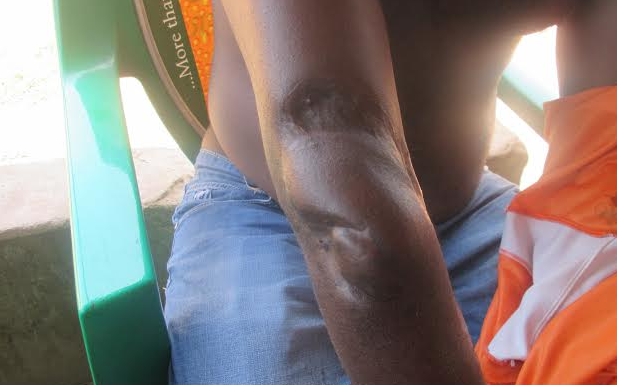
A soldier says after Indian doctors decided it was too late for him to have a surgery, his medical fee was embezzled.
“From the decision-makers at the military hospitals to the highest authorities at the army headquarters, there is a web of corruption at the expense of the soldier’s blood and life,” says a soldier, only after he was promised that he won’t be named to avoid being court-martialled or dismissed from the army.
He gives a few examples: “Sometimes, you get recommendation from above that you will be referred to India or to Germany, but while you’re preparing to travel, you get an order that you will instead be treated in Abuja or in Lagos. It is clear someone somewhere has pocketed the money from your trip, or the person will receive a finder’s fee from the local hospital.
“At other times, you may be referred to India for a particular duration but your stay and amount approved will be drastically reduced by another layer of authority.
“For instance, they have written on your paper that you will be away for three months and they have released $45,000. But the immediate authority will suddenly wake up and say, ‘My friend, you are spending only one month there.’
“They will now issue you money for one month, and I don’t need to tell you that the money for the remaining two months is for their own betterment. Whatever happens to you, even if the money you get is inadequate for your treatment, it is not their business. That one that belongs to them must not be reduced.”
One more soldier explains that there are situations where patients are referred out of the country only to be told a surgery is not required. In such cases, the authorities “refuse to repatriate the funds”.
“I went to India but my evacuation was already late, so the Indian doctors said there was no need for surgery,” he says.
“I returned to Nigeria but they ate my money [sic] even though there was no surgery on my hand. The problem is that they always evacuate late when the damage must have been too deep-seated to be reversed.”
The injured soldiers are not alone in their claims, with a senior army officer blamed soldiers’ neglect on corruption in the army, and calling for “an overhaul” of the system.
“I know some soldiers were referred to the 44 Hospital in Kaduna, but they were left at the mercy of their parents and family. Some of them go to their families for financial support to treat themselves. You can imagine how terrible it is,” he says making no effort to conceal his anger.
“It has to do with corruption; the Nigerian army is supposed to be responsible for their treatment but they will not give you the required treatment because somebody is somewhere making money out of it.
“So technically, the army will say it is responsible for treatment but when you get there, you won’t get the kind of treatment you deserve so you will be forced to source better treatment elsewhere.
“So many things about the army are bad; it needs total overhauling, all the sectors. For example, there are cases in Kaduna that should be referred to India but they won’t, because someone is taking the money while the person is there dying. It’s only if you have an influential person that your case will be referred abroad, else you will be left lying there.”
A pretty grave allegation
Yet another soldier, who asked not to be named for fear of victimisation, fingered Amusu former medical director of the 44 Hospital, as the main reason soldiers have lacked the best care either in the country or abroad.
He cites the example of a colleague of his who was evacuated to India bearing an injury on both legs, with one particularly at the risk of amputation.
“They called Major-General Amusu from India that more money was needed for surgery on the other leg, but she told them that there was no money, so both legs should be amputated,” this soldier says of a colleague of his,” he says.
“But the doctor refused to amputate the leg; he said he could not cut the soldier’s leg because the treatment had already started and that if she was not ready to approve the bill, he would take it over himself.
“The soldier was so angry that he called her on phone and cursed her that her own legs too will be amputated someday. Somebody that is bestowed with managing resources meant for soldiers, and she finds it difficult to let soldiers have access to such services, and the person is still in the army and she was even promoted. That means she has some powerful backers.”
‘Haba Da Allah!’: Army exonerates Amusu
According to Sani Usman, spokesman of the Nigerian army, there is no smidgen of chance that the allegations against Amusu are true.
“This is a very grievous allegation,” he says.
“For you to accuse a major-general of making money out of a wounded soldier, you know it is more or less an abomination.
“I cannot imagine that a whole major-general and a medical doctor of reputation and all the rest will decide to pocket a soldier’s money. There are certain things that honestly are far beyond you in your entire life.
“I can understand that possibly there could be problems here and there, but it is not that bad simply because you want to make money. How much is a soldier’s estacode that a whole major-general will sit on it? Haba Da Allah.”
He adds that some injured soldiers cook up inconceivable stories in order to dishonestly enrich themselves off their injuries.
“They connive with those Indian doctors that every three months they should go back, which is not realistic because you have to process the money and get foreign exchange and we have equally experts here that can diagnose and easily manage some of these conditions that they have been treating in India instead of going every three months,” he says.
‘I feel like dying; I can’t even face my children’
Usman wants injured soldiers to exercise more “patience” but for someone like Hamidu, who is too ashamed to return to his family, any extra second wait is very hard to bear.
“Sometimes, I feel like dying. I feel like dying; I feel like dying,” Hamidu moans repeatedly.
“Imagine that the country we sacrificed our lives for is treating us this way. Okay, they are repairing and rebuilding Maiduguri; a lot of money has been pumped into the reconstruction of destroyed structures. But soldiers that maintained the peace there, nobody is making efforts to rehabilitate them, give them a sense of belonging.
“Rather, we’ll just remain on the hospital bed from morning till night for months, for years. As I speak to you now, some people have been in this hospital for more than two years.”
While he blames authorities of the hospital and the army hierarchy for the delay with prosthesis, he believes President Muhammadu Buhari himself a retired officer, is unaware of the sufferings of injured soldiers.
When the president’s wife visited the hospital in January, she personally handed each soldier a sum of N20,000 and promised to relay her discoveries to her husband.
“We have faith in her in that she gave each of us an envelope containing N20,000, by herself,” he says. “That was a signal that she knew that if she gave the money to the authorities, it would not get to us. We are happy because the money relieved us in buying drugs.”
One major concern for Hamidu is his physical separation from his children, whom he is “hiding” from, because of his condition.
“From August 2015 till now, I haven’t travelled home. I don’t know how to travel,” he laments.
“My wife and children are in Lagos but I cannot go back to them until the army has done something about my condition. If my children see me like this, I will look like vampire to them.
“They will be wondering what happened to their daddy’s hands. My wife was in the hospital with me for three months, but I can’t allow my children see me this way.
“No matter how you see it, my children are lacking that fatherly love. I left home January 2013 and I saw them last year. As I am now, unless somebody assists me, I can’t undress, I can’t bathe. Until I am helped by somebody, I can’t do anything for myself.
“The world is far developed for me to still be relying on people. All I need is the bionic prosthesis and I can get on with my life. Here, they will make arrangements with people who will provide fake, yet it would still gulp the same money that the government released for the original.”
It’s a vicious circle

Soldiers combing the forest for insurgents… they don’t know what the future holds in the event of injury or death.
The dissatisfaction of injured soldiers with their conditions of treatment has grave implications for the war against insurgency.
“What is happening to us is affecting those at the war front, because somebody who is on pass comes to visit me and says ‘Oh boy, since August last year, you are still like this? What are they doing?’ And you expect this same man to go back to the bush to make his own sacrifice after seeing how his buddies have been treated?
“It is not possible. When they remember that those of them that have problem with their legs they are still with crutches, those of them that their legs and hands are chopped off, no artificial prosthetics for them. You still want them to go and lose their own blood? Some of them will just run away!”
True to his arguments, hordes of soldiers in the expansive Sambisa forest and other interiorly located villages of Borno state are concerned by their likely fate in the event of fatal injuries.
Between 2009, when the insurgency began, and 2015, when the military began gaining the upper hand, thousands of soldiers either deserted the army or were dismissed for refusing to fight, while some even committed mutiny in 2014 by aiming bullets at a commanding officer in protest of deaths of soldiers due to inferior firepower. Majority of them have long been re-screened and eventually recalled.
“Go to Kaduna and see my colleagues languishing at the 44 hospital,” one soldier, fresh from Sambisa, had told me in Maiduguri days earlier, adding: “How do you want me to fight with one mind when I know that my family’s future will be bleak if I die or suffer a fatal injury?”
This is the second in the series. Read the first here.
In the next installment of ‘Forgotten Soldiers’, you will be taken to the two leading military hospitals where you will meet soldiers manually fanning their gunshot wounds due to power outage, and one whose right eye has been blinded by RPG fragments since 2014 but is still awaiting proper care.
Twitter: @fisayosoyombo
Editor’s Note: This project was produced with support from the International Centre for Investigative reporting (ICIR)


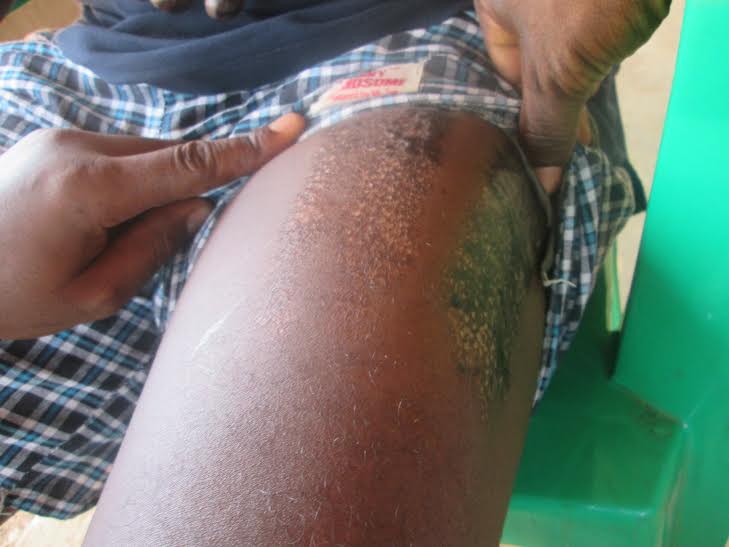
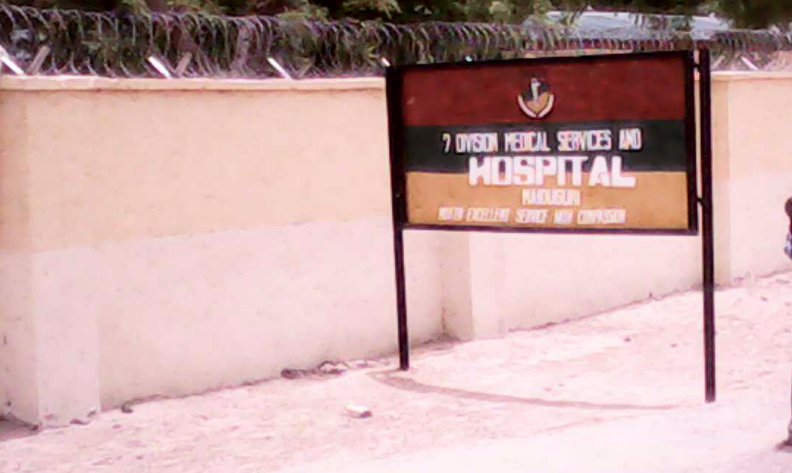
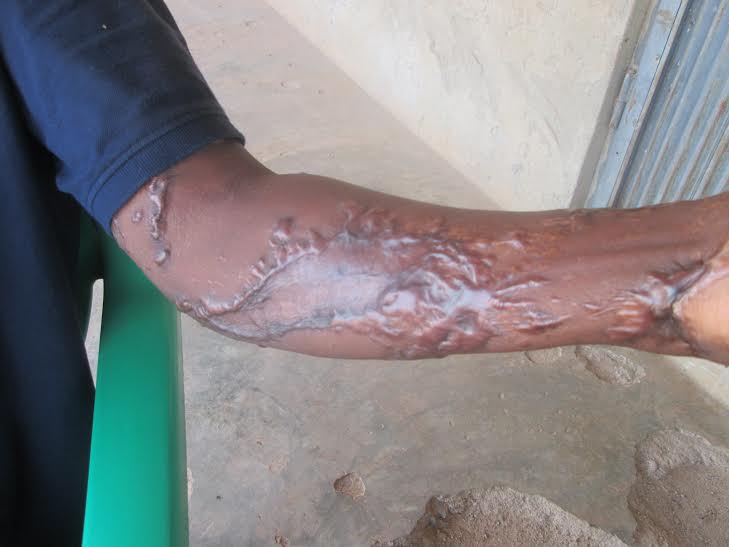
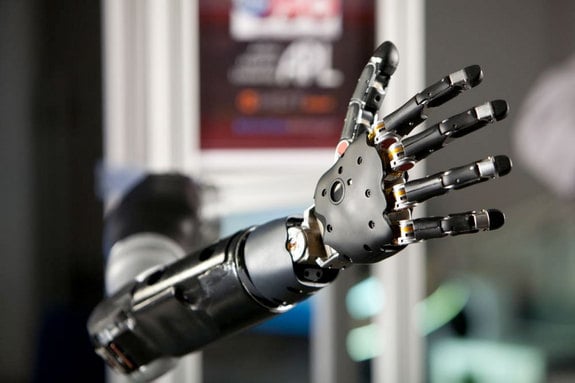
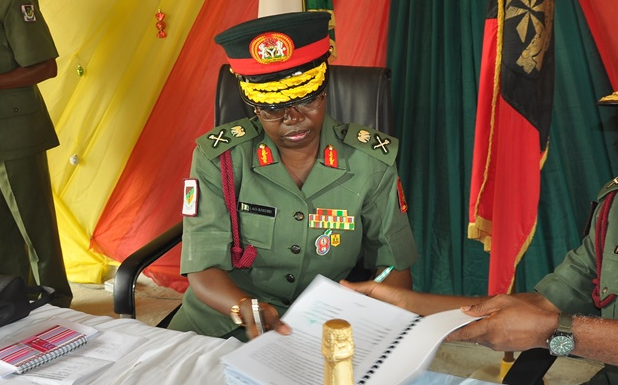
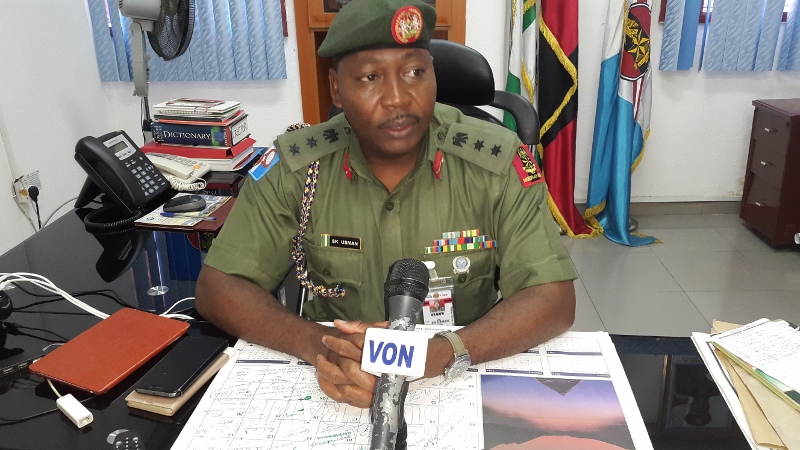
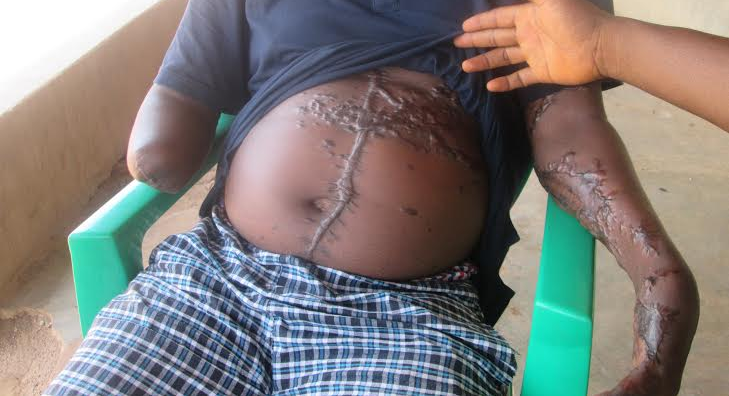











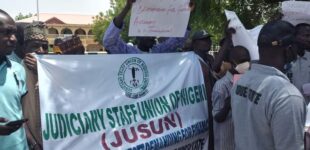


A sad case of blood stained corruption, when will human lives matter in Nigeria?
I wrote a post on my facebook page on honoring the men and women of the Nigerian Military. this is a typical example of how sad we treat our men and women who fight battles to allow us sleep well at night. I am so sad now that I will need to keep my head up to be able to make a comment that makes sense to me.
Your comment..strange that pple are still pessimistic of our military authorities on welfare of non commissioned cadre, issues of such is part of our military culture.